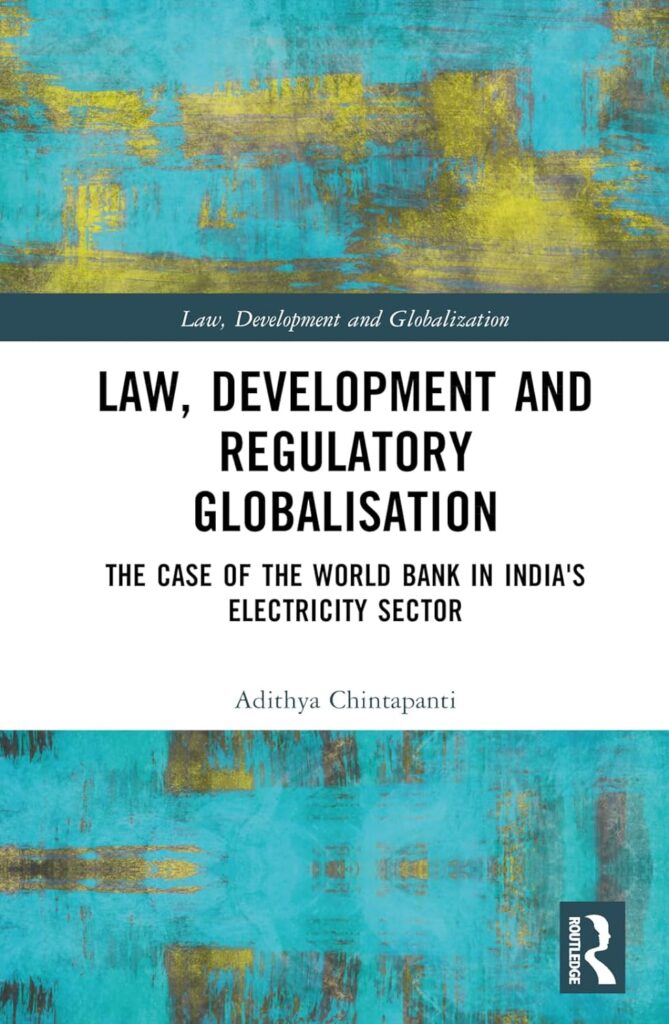The following is an excerpt from the book Law, Development and Regulatory Globalisation: The Case of the World Bank in India’s Electricity Sector, by Adithya Chintapanti.
The mood was euphoric in the LB Stadium in Hyderabad, India, a venue for international cricket contests. On May 14 2004, moments after assuming office, the newly elected leader of the province of Andhra Pradesh signed, in front of supporters and live television, a government order fulfilling his electoral promise to provide free agricultural electricity. Given that the election was seen as a ‘plebiscite’ on World Bank (hereafter the Bank) driven economic reforms, the political signalling was obvious: the new government would halt the economic reforms introduced at the Bank’s behest. The previous government had approached the Bank for financial assistance and advice in 1997 to assist with fiscal deficits. The Bank suggested that the electricity sector, with state ownership and politicised tariffs, was the primary culprit for the financial woes of the state. Amongst other measures, the Bank recommended a withdrawal of the state from the electricity sector through the privatisation of state-owned enterprises and the establishment of a regulatory agency to oversee sectoral activity. More importantly, legislative reform institutionalising the reform prescription was seen as prerequisite to the receipt of any funding. Electricity sector restructuring became highly contentious and galvanised resistance to the reform agenda.

The state-owned electricity sector occupied a central role in the budgetary allocation and welfare politics of Andhra Pradesh, as in most developing countries. The Bank’s reform prescription for Andhra Pradesh was in accord with its policy paper ‘The World Bank’s Role in the Electric Power Sector’ (hereafter the 1993 Policy or 1993 Template). The 1993 Policy reviewed the Bank’s lending to the electricity sector in developing countries and critiqued the inefficiencies emerging from state ownership and the politicisation of the resource’s provision (World Bank 1993). Its prescription was in accord with the changing dominant global consensus regarding the role of the state in economic activity, which promoted a shift from an interventionist state to a regulatory state. This shift can be attributed to the fall of communism in the USSR, the failure of state-led industrialisation in the developing world, and a disenchantment with the model of the welfare state in Western Europe. The 1993 Policy concludes that it is impossible to maintain a ‘business as usual’ approach and that developing countries must, amongst other measures, adopt its regulatory template to be eligible for sectoral financing. The 1993 Policy proposed a radical restructuring of the state in the electricty sector, by placing restrictions on its role in economic activity and insulating economic decision-making from politics. It endeavoured to transform the state in the recipient’s jurisdiction from an interventionist to a neoliberal regulatory state by imposing constitution-like obligations on its functioning (Schneiderman 2001; Rawlings 2010).
The Bank’s insistence that the 1993 Policy’s regulatory model be incorporated into domestic legislation in order for a state to be eligible for electricity sector financing resulted in its implementation in 88 developing jurisdictions (Foster et al. 2017). In this context, the announcement of free electricity in the LB Stadium which signalled a halt to the 1993 Policy reforms, though it took place in a provincial capital, was part of a contest between global views on the role of the state in economic activity. This book argues that enacting legislation along the lines of a globalising regulatory template does not automatically signify the ‘reception’ (Twining 2004) or absorption of the transplant into the recipient jurisdiction’s administrative and institutional processes. In other words, the legal transplant may not deliver the intended outcomes. The space between the state and society is not a vacuum, and, given its dynamics, any externally imposed regulatory intervention may be altered in its implementation (Lange 2003; Griffiths 1986).
The process of introducing a globalising regulatory template to a particular jurisdictional context can be compared with the phenomenon of light being refracted while passing from a rarer to a denser medium. The nature of the medium, i.e., the space between state and society, is contingent on the social, political, economic, and cultural dynamics unique to a particular jurisdiction and determines the degree of refraction. In other words, the trajectory of reform implementation, though premised on a uniform template, differs from jurisdiction to jurisdiction according to their unique dynamics, which are referred to in the present enquiry as ‘regulatory attributes.’ The book argues that identification of regulatory attributes helps chart the pathways of reception and resistance to legal reform. The book, therefore, explores the inter-related themes of the changing perception of the role of the state in economic activity in terms of both legislative mandates and political expectations; the role of the Bank as a ‘globaliser’ of regulations (Woods 2006); regulatory reform aimed at repositioning the role of the state; and the impact of regulatory attributes on externally imposed standard regulatory templates incorporated into domestic legislation. These themes will be explored through the lens of a developing jurisdiction, i.e., India’s experience of implementing the Bank’s 1993 Policy. In the context of Andhra Pradesh’s experience with implementing the state law giving effect to the Bank’s 1993 Policy, the book argues that the regulatory attributes associated with the electricity sector in Andhra Pradesh prevented effective implementation. Furthermore, not only was the law ineffective, but the wider social economic and political resistance resulted in a rupture in the fabric of state law resulting in legal pluralism, or the coexistence of more than one version of law applicable to the sector.
Articles represent the opinions of their writers, not necessarily those of ProMarket, the University of Chicago, the Booth School of Business, or its faculty.
Reprinted with permission from Law, Development and Regulatory Globalisation: The Case of the World Bank in India’s Electricity Sector, by Adithya Chintapanti, published by Routledge. © 2024. All rights reserved.






